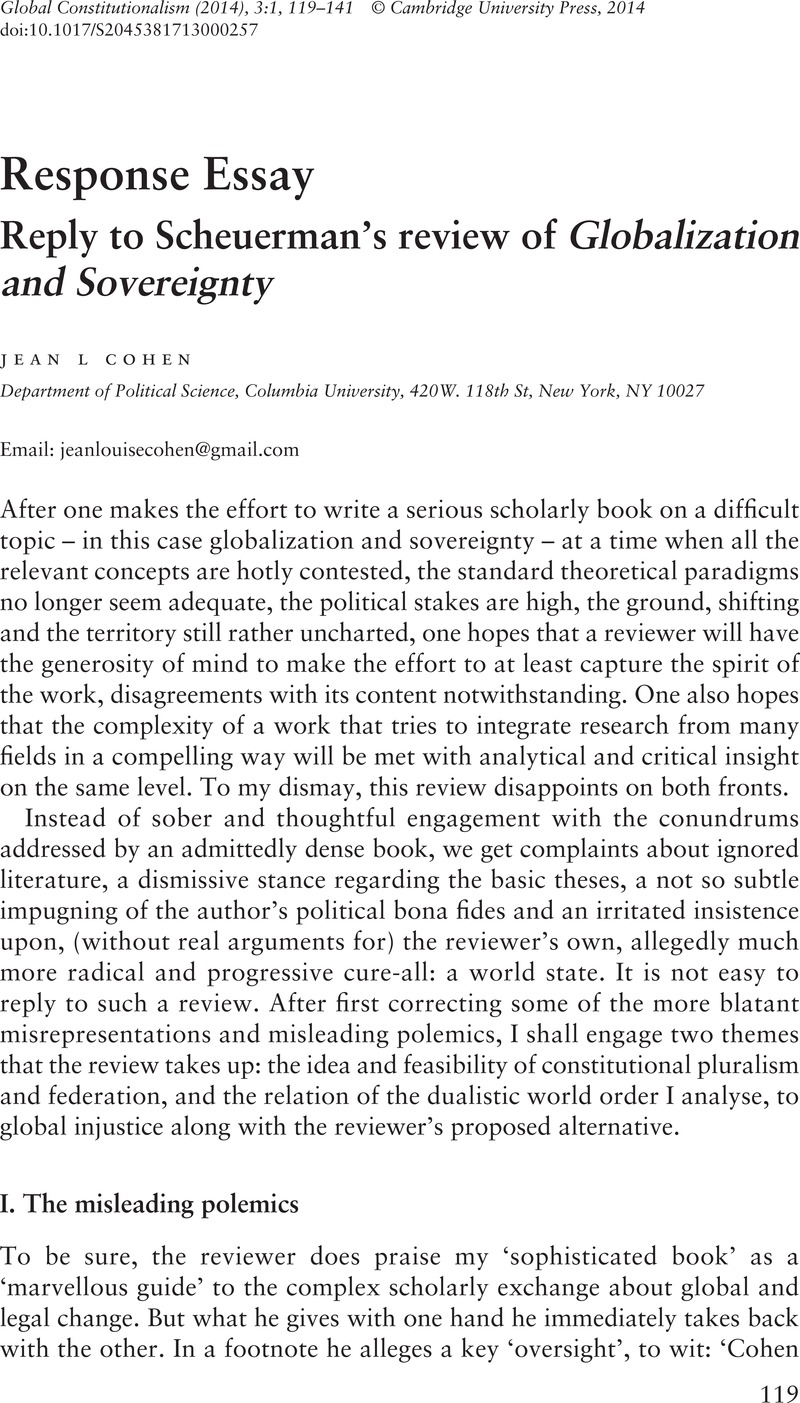Published online by Cambridge University Press: 13 February 2014

1 I first cite Bull, Hedley, The Anarchical Society (3rd edn, Palgrave Macmillan, Basingstoke, 2002)Google Scholar on the first page of the Introduction to Globalization and Sovereignty (n 2).
2 Philpott, D, Revolutions in Sovereignty: How Ideas Shaped Modern International Relations (Princeton University Press, Princeton, NJ, 2001)Google Scholar is also drawn on and cited in my text.
3 I first cite Anghie, Anthony, Imperialism, Sovereignty and the Making of International Law (Cambridge University Press, Cambridge, 2004)Google Scholar in the Introduction (3, n 11). I also cite Gong, GW, The Standard of ‘Civilization’ in International Society (Clarendon Press, Oxford, 1984).Google Scholar
4 I cite two important IR theorists for the idea of sovereignty as inclusion in international organizations: Chayes, A and Chayes, AH, The New Sovereignty: Compliance with International Regulatory Agreements (Harvard University Press, Cambridge, MA, 1995).Google Scholar See discussion in Chapter 5 of my book.
5 Robinson, WI, ‘Social Theory and Globalization: The Rise of a Transnational State’ (2001) 20 Theory and Society 157Google Scholar and Shaw, M, Theory of the Global State: Globality as an Unfinished Revolution (Cambridge University Press, Cambridge, 2000)Google Scholar both cited in note 22 of Scheuerman’s review.
6 See Introduction and Chapters 1, 2 and 5 of Cohen, Globalization and Sovereignty.
7 This ground is well trodden. See Chapter 3, ‘International human rights, sovereignty and global governance: toward a new political conception’.
8 See the Introduction and Chapter 5 of Cohen, Globalization and Sovereignty.
9 Ibid.
10 See my discussion in Chapter 1 of Globalization and Sovereignty.
11 See ibid, Chapter 4, ‘Sovereignty and human rights in ‘‘post-conflict’’ constitution-making: toward a jus post bellum for ‘‘interim occupations’’’ and Chapter 5, ‘Security Council activism in the ‘‘war on terror”: legality and legitimacy reconsidered’.
12 Ibid, Chapter 2.
13 I am indebted to Beaud, Olivier, Théorie de la Fédération (Presses Universitaires de France, Paris, 2007)Google Scholar for this.
14 See Chapters 1 and 5 of Cohen, Globalization and Sovereignty.
15 See my discussion in ibid, 68.
16 There are, as I show, respectable, sceptical arguments on the other side. See my discussion in Chapters 1 and 5.
17 See Globalization and Sovereignty, 135.
18 Following Olivier Beaud.
19 See the cogent discussion by Isiksel, T, ‘Global Legal Pluralism as Fact and Norm’ (2013) 2(2) Global Constitutionalism 160–95.CrossRefGoogle Scholar
20 I am charged with reproducing the ‘rather old-fashioned republican view’ that smaller polities do a better job at achieving self-government than large and populous ones. I am also allegedly ‘haunted’ by the influence of Hannah Arendt’s ‘idiosyncratic republican enmity to cosmopolitanism’. This, in contradiction with key features of Habermas’ recent thinking, the other alleged influence on my book. Frankly, it baffles me how anyone who has read my chapter on federation could attribute either an old-fashioned or idiosyncratic republicanism to me although I plead guilty to admiring and disagreeing with the work of both Arendt and Habermas. For the entire (and very long) chapter is predicated on precisely the opposite view, namely that through the mechanisms of political representation (which Arendt herself unfortunately deplored) among other devices, large polities are and can be viable self-governing constitutional democracies without having to resort to conquest, empire, or tyranny.
21 My concerns about the ‘horrific’ political violence that would likely follow on a premature attempt to set up a global state are apparently misguided because the same criticism could apply to any agenda for radical political change. Scheuerman invokes aspirations for a more egalitarian global economy or radical overhaul of gender relations in this context. Apparently if I were to be consistent, I would thus not embrace global economic justice nor gender equality as morally compelling goals because they too might ‘trigger violent resistance’. But the analogy is misplaced, because it confuses different levels of analysis: gender equality and economic justice are not comparable projects to a world state. Analytically the former two are both moral principles (equality/justice) while a global state and a monist global constitutional order involve political and legal institutional structures whose normative character is not self-evident: they may or may not foster equality, justice, freedom, liberty and so forth.